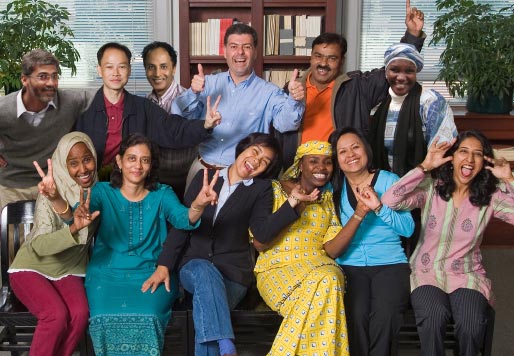hello all,
yesterday amineh & i attended stevie beez' 2 hour symposium about the social determinants of health at the school of social work. the majority of the people in the audience were social work students or social workers themselves.

dr. b went through spoke about his history & his metamorphosis from initially believing that individual actions begat specific health outcomes 2 later believing that socio-political & or socio-economic factors may be even more important factors. he stated that he came to that conclusion in 1993 but he did not go public with his beliefs until 1995. he told the story of how he harangued patients who were smokers when he saw them in the emergency room until he saw statistics from japan (the industrialized nation with the worlds' highest life expectancy) apparently the japanese have a much higher rate of both alcohol use & smoking yet..........there is a higher life expectancy. why??????? dr. b thinks that it has to do with" wa" a japanese idea of group harmony thus a built in social support network. he asked the audience members if they had ever seen japanese tourists taking pictures et al... by themselves.
1 of the audience members stated that the japanese idea of "wa" worked because japan is a homogenous society but............ the author interjected that it's just not true.

japan has always been multi-ethnic from ancient times there have been interactions with indo-malays, chinese, koreans indians etc... few people outside of japan or more precisely the japanese korean community are aware of the fact that that 25% of the people killed during the bombings of hiroshima & nagasaki were of korean descent. iinyhowz.......the author stated (when he was so mercilessly put on the spot by dr. b) that what is going on in japan is the belief that everyone can achieve (to a certain extent) whether they are multi-ethnic or not.
another audience member asked if there were similar examples of "wa" in the u.s. & dr. b told the story about an italian american settlement in rosetta , pennsylvania whose impoverished & oppressed inhabitants had higher health indicators than the general population while living in their isolated community but... upon moving out to the general populace their health declined.
he also talked about early childhood & even prenatal influences on lifelong health via biological embedding, secure attachments & even what our grandmothers stressors were when they were pregnant.
i'll wrap this up by saying that he emphasized that we must treat populations, not individuals. the countries with the best health outcomes are the 1z with the least amount of income disparities & with good social gvt. networks a.e. sweden, & that the 3 main factors that got japan to where it is today are democratisation, decentralization & demilitarization.
there was of course a lot more but....... if you want to learn about it go to the source.
a dyos
Santiago
p:s,
i don't know where dr. b findz the time 2 amass all of the in4m8shun that he duz...itz soooooo inspiring :)
yesterday amineh & i attended stevie beez' 2 hour symposium about the social determinants of health at the school of social work. the majority of the people in the audience were social work students or social workers themselves.

dr. b went through spoke about his history & his metamorphosis from initially believing that individual actions begat specific health outcomes 2 later believing that socio-political & or socio-economic factors may be even more important factors. he stated that he came to that conclusion in 1993 but he did not go public with his beliefs until 1995. he told the story of how he harangued patients who were smokers when he saw them in the emergency room until he saw statistics from japan (the industrialized nation with the worlds' highest life expectancy) apparently the japanese have a much higher rate of both alcohol use & smoking yet..........there is a higher life expectancy. why??????? dr. b thinks that it has to do with" wa" a japanese idea of group harmony thus a built in social support network. he asked the audience members if they had ever seen japanese tourists taking pictures et al... by themselves.
1 of the audience members stated that the japanese idea of "wa" worked because japan is a homogenous society but............ the author interjected that it's just not true.

japan has always been multi-ethnic from ancient times there have been interactions with indo-malays, chinese, koreans indians etc... few people outside of japan or more precisely the japanese korean community are aware of the fact that that 25% of the people killed during the bombings of hiroshima & nagasaki were of korean descent. iinyhowz.......the author stated (when he was so mercilessly put on the spot by dr. b) that what is going on in japan is the belief that everyone can achieve (to a certain extent) whether they are multi-ethnic or not.
another audience member asked if there were similar examples of "wa" in the u.s. & dr. b told the story about an italian american settlement in rosetta , pennsylvania whose impoverished & oppressed inhabitants had higher health indicators than the general population while living in their isolated community but... upon moving out to the general populace their health declined.
he also talked about early childhood & even prenatal influences on lifelong health via biological embedding, secure attachments & even what our grandmothers stressors were when they were pregnant.
i'll wrap this up by saying that he emphasized that we must treat populations, not individuals. the countries with the best health outcomes are the 1z with the least amount of income disparities & with good social gvt. networks a.e. sweden, & that the 3 main factors that got japan to where it is today are democratisation, decentralization & demilitarization.
there was of course a lot more but....... if you want to learn about it go to the source.
a dyos
Santiago
p:s,
i don't know where dr. b findz the time 2 amass all of the in4m8shun that he duz...itz soooooo inspiring :)




2 comments:
Wow !Santiago !! welcome to IHP Diaries :-)
Santiago, wasn't that mysterious "another audience" member YOU? I even have a pic of you with the mic ;) I'll post it soon along with other pics from Stephen's brilliant PowerPoint presentation. Thank you for sharing.
Post a Comment